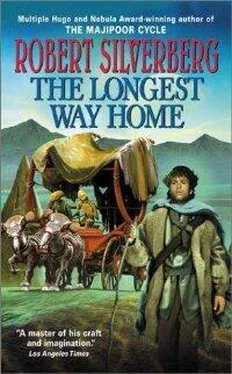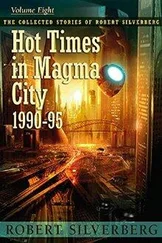Uninhabited by Masters and Folk and Indigenes, at any rate. There was plenty of animal life. Joseph did not recognize any of the creatures he encountered as he went along, though some of them seemed to be northern variants of animals that were native to the southern continent. There was a plump round beast, quite large, with coarse red fur and a fat little comical tail, that seemed surely to be a relative of the benevongs of the south. There was another, cat-sized, with huge restless eyes and a formidable cloak of twitching blue spines, that beyond much doubt was the local version of the shy, easily frightened thorkins that he had sometimes seen digging for tasty roots along the banks of country streams. But the rest were completely new to him: a squat, broad-nosed climbing animal with brown and yellow spots; and a big, loose-jointed, thick-thighed creature whose tiny, pointed head seemed to have been borrowed from a much smaller animal; and a low-slung snuffling thing, long and sleek, that moved across the land in tightly clustered packs.
None of these showed the slightest fear of him, not even the one that looked like a thorkin. A thorkin of the Southland would have turned and bolted at the first sign of a human, but this animal simply stood its ground and stared. The sleek pack-creatures, who appeared to be browsing for insect nests in the ground, went right on about their business without paying heed to him at all. The big shuffling beast with the small head actually seemed to want to be friendly, wandering up so close that it was Joseph who backed uncertainly away.
One day he stumbled into a small encampment of poriphars in a clearing at the edge of a grove of handsome little white-barked trees, and understood why there were no Indigene villages in these parts. Indigenes would not trespass on the territory of other intelligent beings; and poriphars, like noctambulos and meliots and a couple of other native species, qualified as intelligent, if only just marginally. They were mere naked nomadic beasts, but it was known that they had a language; they had a tribal structure of some sort; they were advanced enough technologically to have the use of fire and simple tools. That was about all Joseph knew about them. A few wandering tribes of poriphars were found in Helikis, but they were mainly a northern species.
He came upon them suddenly, and they seemed as uncertain of how to regard the strange being who had materialized among them as Joseph was to deal with them. There were about a dozen of them, graceful impressive-looking creatures about his own size, with taut, muscular bodies that were densely covered with thick black-and-white-striped fur. Their long, narrow, leathery feet ended in powerful curving claws; their black, glossy hands were equipped with small, efficient-looking fingers. They had triangular faces with jutting wolfish snouts terminating in shiny black noses. Their eyes, large and bright and round, a deep blue-black in color, were protected by heavy brow-ridges.
The poriphars were sitting in a circle around a crude oven made of rocks, roasting spitted fish over the flames. When Joseph stepped out from behind a great gray boulder into their midst, very much to his surprise and theirs, they reacted with immediate uneasiness, moving closer to one another, bodies going tense, nostrils quivering. Their eyes were fixed closely on him, warily, as though a solitary human being, traveling on foot and carrying no visible weapons, might actually pose some threat to this band of strong, sturdy animals.
Slowly and clearly Joseph said, speaking in Indigene, “I am a traveler. There is no one else with me. I am going southward.”
No response. The same wary glances.
“I am hungry. Can you give me some food?”
The same keen stares, nothing more.
The aroma of the roasting fish was overwhelming. It filled the air. Joseph felt famished, almost dizzy with hunger. He had eaten nothing but dried meat and berries for days, in decreasing quantities as his supplies began to run low. He had practically none left by now.
“Can you understand me?” he asked. He patted his abdomen. “Hunger. Food.”
Nothing.
He had often heard that all the various intelligent life-forms of Homeworld were able to speak Indigene, but perhaps that was not true. Without much hope Joseph tried Folkish and then Master, with the same result. But when he patted his stomach again and pointed silently to one of the skewers of fish, then to his own lips, and pantomimed the act of chewing and swallowing, they seemed to comprehend at once. A brief debate ensued among them. Their language was one of rapid clicks and buzzing drones, probably impossible for human vocal apparatus to imitate.
Then one of the poriphars stood—it was a head taller than Joseph; it probably could have killed him with one swipe of those sinewy arms—and yanked a skewer of fish from the fire. Carefully, using those agile little fingers with an almost finicky precision, it pried a thick slab of pale pinkish meat from the fish and handed it to him.
“Thank you,” Joseph said, with great gravity.
He performed an elaborate salute, touching his forehead and his chest and bowing. Most likely the gesture had no meaning whatever for the poriphars, but it was the best he could do. He wished he had something to offer them in return, but he doubted that his remaining berries would interest them, and there was nothing else he could spare.
The temptation to cram the fish into his mouth and bolt it all down at once was a hard thing to resist, but Joseph ate as slowly as he could. It had a sweet, smoky flavor, heartbreakingly delicious. The poriphars remained quite motionless while he ate, watching him. Occasionally one of them made a clicking, buzzing comment. They still seemed uneasy. Their restiveness was an almost palpable thing.
Joseph had been alone for so many days that he wanted to stay for a while, somehow to talk with them, to tell them about himself and learn things about them, perhaps to find out about the nature of the route that lay ahead, or even about the civil war. But of course all that was impossible. There was no way to communicate. And he did not need a degree in alien psychology to understand that they had no interest in making his acquaintance, that the only thing they desired from him was that he remove himself from their presence without further delay.
Which he did, after making a final brief speech in Indigene on the off chance that they might indeed know something of that language. He apologized for having disturbed them and told them how grateful he was for their kindness in feeding a lone hungry wanderer, how he would if in any way he could repay their hospitality at another time. To this they made no reply, or showed any indication that they had understood. He walked away from them without looking back.
A couple of days later he saw a plane pass high overhead—the first manifestation of the outside world since he had fled from the Indigenes. Joseph stood staring up, wondering whether he was experiencing some hallucination brought on by hunger. The plane was so far above him, a mere dark winged speck in the sky, that he could hardly hear it at all, nothing more than a distant faint humming sound such as an insect might have made, nor could he identify it in any way. It was traveling in a northwesterly direction. Whose plane was it? Was it possible that they still could have regular commuter service between Helikis and Manza?
It seemed like a thousand years ago that he had made his own flight northward. Ten thousand; a million. The airstrip at Keilloran; the excitement of departure; his father and brothers and sisters loading him down with gifts to bring the Getfens; Anceph and Rollin climbing aboard with the luggage, and then Balbus, beckoning to him to follow. The flight had taken eleven hours, the longest flight of his life. How creaky he had felt when he disembarked at the Getfen airstrip! But then, his fair-haired laughing Getfen cousins all around him, sturdy Wykkin and bright-eyed Domian and lovely fragrant Kesti, and dark, stocky Gryilin Master Getfen behind them, his hosts for the summer, his new friends, the companions of his coming-of-age year—
Читать дальше












